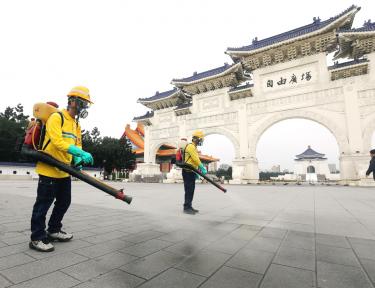Local authorities have finished carrying out poultry exterminations at six farms confirmed to have been struck by avian influenza subtypes H5N2 and H5N8, with about 12,945 geese and ducks culled in total, the Council of Agriculture said yesterday, ordering farms nationwide to suspend butchering waterfowls until noon tomorrow.
The transportation of poultry is also being halted, while all the vehicles, cages and containers used at butcheries and poultry farms are to be thoroughly disinfected, Bureau of Animal and Plant Health Inspection and Quarantine Director-General Chang Su-san (張淑賢) said at a news conference in Taipei.
Chang said that originally, about 8,500 geese and 7,000 layer ducks had been targeted for extermination, but more than 3,000 geese died from H5N2 infections before the cull began.
Meanwhile, the bureau said that as of noon yesterday, it had received reports of suspected virus-induced poultry deaths from 14 additional facilities, including a goose farm in Changhua County. The Changua case put the total number of regions thought to be affected to five, including Yunlin, Chiayi and Pingtung counties, as well as Greater Tainan.
Chang said the avian influenza outbreaks have so far only affected waterfowl, with geese accounting for the vast majority of casualties.
“Few fatalities have been reported among ducks. The effect H5N2 has on ducks is that it greatly reduces their egg yields, to virtually zero,” she said.
Chang reiterated that both the H5N2 and H5N8 strains are new to the nation — the former being a “restructured” version of the H5N2 subtype previously found in Taiwan and bearing the genome sequences of both H5N2 and H5N8, while the H5N8 strain was likely transmitted from South Korea by migratory birds, the major means of transmission for avian flu.
She said that inadequate protective measures at feeding sites on the affected farms were likely a factor in the outbreak, because they could have allowed migratory birds carrying the viruses to come into contact with the poultry. Chang urged farm administrators to redouble disease prevention efforts by setting up nets around their facilities, especially around feeding sites.
“In the future, farm owners who do not cover their facilities with nets and fail to make the necessary improvements after a given period of time will not be granted compensation in the event of an avian influenza outbreak,” she said.
Chang rejected speculation about a cover-up that have been circulating academic and media circles, after independent journalist and filmmaker Kevin Lee (李惠仁) said on Facebook that council officials were “concealing” the reality of the situation, thereby giving rise to the large-scale outbreaks. She said that all the inspections the authority carried out since last month in response to reports of possible infections followed standing operating procedure.
Meanwhile, Animal Husbandry Department division head Chiang Wen-chuan (江文全) said the supply chain has been unaffected by the outbreak and that the wholesale price of geese has remained stable in spite of the situation.
Duck Association secretary-general Lee Hung-chung (李鴻忠) attributed the outbreaks to a slow response from poultry farmers, saying that many did not recognize the symptoms of their birds — which reportedly began to show as early as late October last year — as those caused by avian flu because they are not the traditional carriers of the virus.
“With all the literature published in the US and all the veterinarians in Taiwan saying that waterfowl are carriers of the avian flu, who would have thought that they would become victims as well?” he said.
The insufficiency of the compensation the council offers to farmers in the event of outbreaks — 60 percent of the poultry’s market price — also prompted farmers to delay reporting, while they tried in vain to cure the ailing birds, Lee said.
“I believe that after learning this painful lesson, poultry farmers will notify the authorities at the first hint of an outbreak from now on,” he said.
Source: Taipei Times - 2015/01/13





















